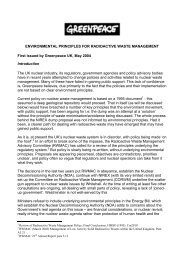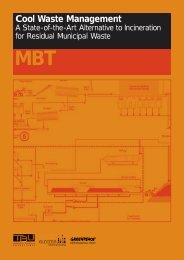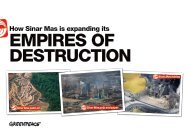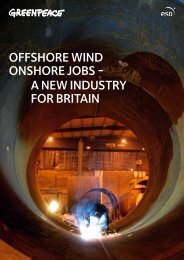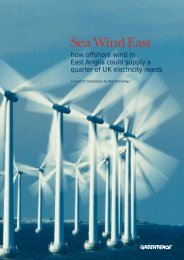bp and shell: rising risks in tar sands investments - Oil Change ...
bp and shell: rising risks in tar sands investments - Oil Change ...
bp and shell: rising risks in tar sands investments - Oil Change ...
You also want an ePaper? Increase the reach of your titles
YUMPU automatically turns print PDFs into web optimized ePapers that Google loves.
Table 1: CO 2<br />
<strong>in</strong>tensity of different <strong>tar</strong> s<strong>and</strong>s extraction methods<br />
Activity<br />
GHG <strong>in</strong>tensity<br />
(kg CO 2<br />
e/barrel)<br />
GHG <strong>in</strong>tensity (kg CO 2<br />
e/barrel) <strong>in</strong>clud<strong>in</strong>g<br />
45 kg CO 2<br />
e/barrel for ugrad<strong>in</strong>g of bitumen<br />
M<strong>in</strong><strong>in</strong>g of bitumen 35 80<br />
SAGD production of bitumen 47 55 100<br />
THAI production of bitumen 48 65 110<br />
Cyclic Steam production of bitumen 49 90 135<br />
Source: The Climate Implications of Canada’s <strong>Oil</strong> S<strong>and</strong>s Development – Pemb<strong>in</strong>a Institute 29 November 2005.<br />
http://pubs.pemb<strong>in</strong>a.org/reports/oils<strong>and</strong>s-climate-implications-backgrounder.pdf, p10.<br />
It is highly likely that Canada will come under <strong>in</strong>creas<strong>in</strong>g <strong>in</strong>ternational<br />
pressure to make stronger commitments than these. Furthermore,<br />
with the Conservative federal government of Steven Harper currently<br />
govern<strong>in</strong>g without a parliamen<strong>tar</strong>y majority it is considered quite<br />
possible that the federal election, which has to happen by October<br />
2009 but could happen sooner, may br<strong>in</strong>g about a change of<br />
government. If Stéphane Dion’s Liberal Party does come to power, it<br />
has promised that it would br<strong>in</strong>g a more aggressive GHG reduction<br />
policy <strong>in</strong>to force. 56<br />
The full details of current Canadian government policy are not<br />
expected until autumn 2008. However, it <strong>tar</strong>gets emissions from <strong>tar</strong><br />
s<strong>and</strong>s projects primarily through the implementation of carbon capture<br />
<strong>and</strong> storage (CCS) by 2018 for projects that s<strong>tar</strong>t up after 2012.<br />
Through this strategy, very little if any reduction will be achieved prior<br />
to 2018. The emissions <strong>in</strong>tensity reduction obligations can be met by<br />
pay<strong>in</strong>g for ‘pre-certified <strong>in</strong>vestments’, which amounts to putt<strong>in</strong>g<br />
money aside for CCS development rather than actual emissions<br />
reductions <strong>in</strong> this period. 57<br />
Furthermore, emission <strong>in</strong>tensity reductions have very little mean<strong>in</strong>g if<br />
the activity <strong>in</strong> question is grow<strong>in</strong>g exponentially. With <strong>tar</strong> s<strong>and</strong>s<br />
production forecast to roughly treble by 2020, 58 a m<strong>in</strong>or reduction <strong>in</strong><br />
per barrel emissions still leads to a massive <strong>in</strong>crease <strong>in</strong> pollution for the<br />
sector. Even <strong>in</strong> the optimistic scenario of CCS progress<strong>in</strong>g at the pace<br />
outl<strong>in</strong>ed <strong>in</strong> the federal government’s climate action plan, by 2020 the<br />
total emissions from <strong>tar</strong> s<strong>and</strong>s projects would still be nearly double<br />
what they were <strong>in</strong> 2006. 59<br />
Doubts about the viability of the 2018 <strong>tar</strong>get have been expressed by<br />
one of the members of the Alberta Carbon Capture <strong>and</strong> Storage<br />
Development Council <strong>and</strong> a key figure <strong>in</strong> Canada’s power sector. Don<br />
Lowry, President <strong>and</strong> CEO of EPCOR Utilities <strong>and</strong> Chair of the<br />
Canadian Electricity Association, spoke on 19 June 2008 to the<br />
Economic Club of Toronto on how Canadian policy makers can help<br />
accelerate a transition to clean energy. Regard<strong>in</strong>g the timel<strong>in</strong>es<br />
proposed by the federal government for CCS <strong>in</strong> coal fired power plants<br />
<strong>and</strong> <strong>tar</strong> s<strong>and</strong>s projects he said:<br />
‘Are these timel<strong>in</strong>es achievable? EPCOR’s view is that the federal<br />
Clean Air Framework significantly underestimates the scale,<br />
scope, time <strong>and</strong> cost required to achieve its objectives. We have<br />
no better chance of reach<strong>in</strong>g these timel<strong>in</strong>es than m<strong>and</strong>at<strong>in</strong>g<br />
Canada’s medical establishment to cure the common cold by<br />
2012.’ 60<br />
While tighter carbon regulation is <strong>in</strong>evitable, uncerta<strong>in</strong>ty still rema<strong>in</strong>s<br />
regard<strong>in</strong>g how much more aggressive it will become. This uncerta<strong>in</strong>ty<br />
poses a major risk to <strong>tar</strong> s<strong>and</strong>s projects. As the sector plays such a<br />
huge role <strong>in</strong> Canada’s emissions growth, it will become the focus of<br />
tighter regulation as the urgency surround<strong>in</strong>g climate change deepens<br />
<strong>in</strong> both Canada <strong>and</strong> <strong>in</strong>ternationally. But the biggest questions surround<br />
the key technology that the <strong>in</strong>dustry hopes will solve the problems of<br />
<strong>tar</strong> s<strong>and</strong>s emissions without requir<strong>in</strong>g a scale back of production – CCS.<br />
CARBON CAPTURE AND STORAGE<br />
The federal <strong>and</strong> prov<strong>in</strong>cial government both depend on carbon capture<br />
<strong>and</strong> storage (CCS) to achieve the climate change plans they have<br />
proposed.<br />
In April 2008, f<strong>in</strong>ancial analysts at Raymond James Ltd produced an<br />
<strong>in</strong>-depth study of the impacts of the federal government’s proposed<br />
legislation regard<strong>in</strong>g CCS for the <strong>tar</strong>s s<strong>and</strong>s <strong>in</strong>dustry. Among their<br />
conclusions were:<br />
Y There is a lack of visibility <strong>and</strong> clarity with respect to regulatory<br />
frameworks… the tim<strong>in</strong>g of br<strong>in</strong>g<strong>in</strong>g clarity to the GHG issue as<br />
it relates to the oil s<strong>and</strong>s sector is not on the horizon.<br />
Y Companies with projects com<strong>in</strong>g on stream after 2012 are subject<br />
to significantly more uncerta<strong>in</strong>ty.<br />
Y Projects that are slated to come on stream near the 2012<br />
timeframe will likely have to consider implement<strong>in</strong>g CCS compliant<br />
processes <strong>in</strong> the design phase, which could mean additional upward<br />
pressure on project cost estimates. 61<br />
Clearly if CCS is m<strong>and</strong>ated to be applied to BP <strong>and</strong> Shell’s projects that<br />
s<strong>tar</strong>t up after 2012 there will be significant cost pressures on those<br />
projects. BP’s Sunrise deal with Husky was announced three months<br />
before the federal regulations. The project is scheduled to s<strong>tar</strong>t up <strong>in</strong><br />
2012. Meanwhile Shell has about 450,000 b/d of production<br />
scheduled for development from 2012 (see graph page 7).<br />
While the uncerta<strong>in</strong>ty surround<strong>in</strong>g the detail of these regulations will<br />
exist for some time, the cost implications are also unclear, creat<strong>in</strong>g<br />
further uncerta<strong>in</strong>ty around the impact CCS will have on the costs of<br />
project development <strong>and</strong> operation. The Raymond James report<br />
estimated that costs for a SAGD <strong>in</strong> situ project could range from<br />
C$0.14 to C$9 per barrel <strong>and</strong> for an <strong>in</strong>tegrated m<strong>in</strong><strong>in</strong>g project<br />
(m<strong>in</strong>e <strong>and</strong> upgrader) between C$0.23 <strong>and</strong> C$15.60 per barrel. 62<br />
18



![[2007] EWHC 311 - Greenpeace UK](https://img.yumpu.com/22079793/1/184x260/2007-ewhc-311-greenpeace-uk.jpg?quality=85)

